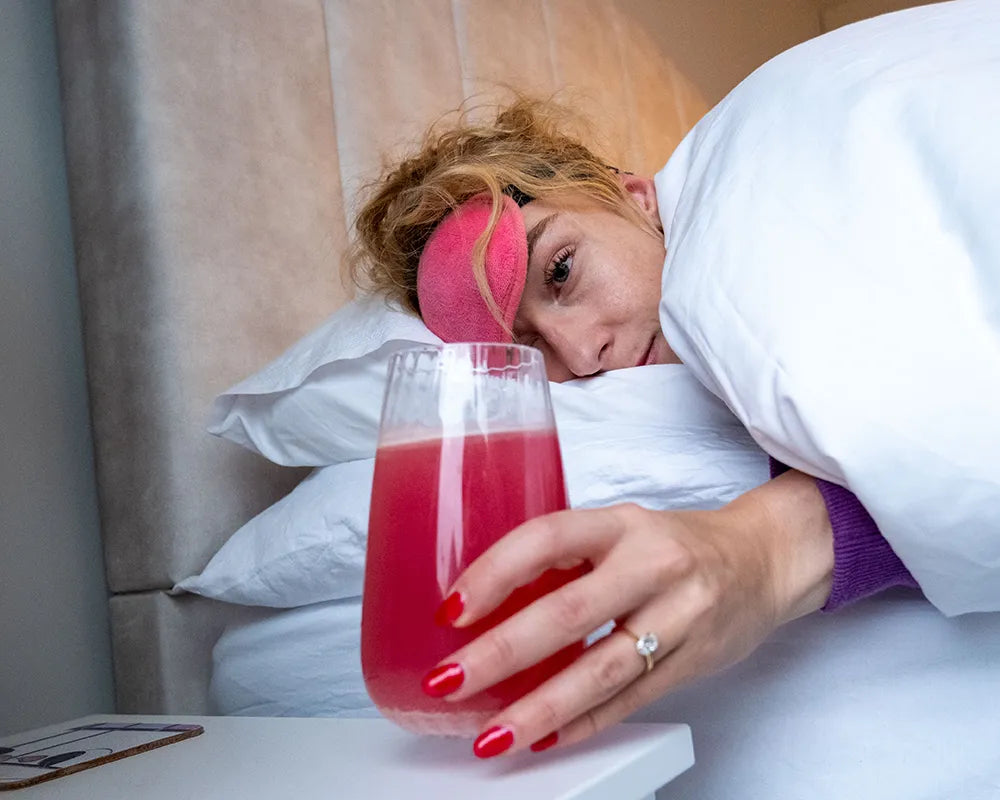Hair of the dog: Can more alcohol cure a hangover?
We've all been there — waking up with a pounding headache, queasy stomach, and that dreadful sense of regret after one too many the night before.
In these moments of despair, you might have heard the advice to have a drink to feel better. Known as "hair of the dog", this remedy is as old as time. But does it actually work? Let's explore the science and see if more alcohol can genuinely cure a hangover.
What is hair of the dog?
Hair of the dog is a familiar term used for having another alcoholic drink the morning after a night of drinking to alleviate hangover symptoms. It comes from an old belief that the best way to treat a rabid dog bite is to apply some of the dog's hair to the wound: the hair of the dog that bit you!
Over time, many drew different meanings from the phrase, including for hangovers.
For some, it's a go-to hangover remedy. The logic is simple: if alcohol causes your hangover, then a little more alcohol might help fix it. Some people swear by hair of the dog, claiming it takes the edge off their symptoms. But is there any truth to this age-old advice, or is it just a myth?
The science behind hair of the dog
When you consume alcohol, your liver breaks it down into acetaldehyde, a toxic substance that contributes to hangover symptoms like nausea, headaches, and fatigue. Eventually, acetaldehyde is further broken down into less harmful substances and eliminated from your body.
The idea behind the hair of the dog is that by drinking more alcohol, you might temporarily prevent your body from fully processing the acetaldehyde, thus delaying the onset of hangover symptoms.
In theory, this could make you feel better in the short term because your body isn't dealing with the full effects of a hangover yet. However, this doesn't mean the toxins have disappeared - they're just delayed. And when they do catch up with you, you might feel even worse.
There's also the role of congeners to consider. Congeners are byproducts of fermentation found in alcohol, especially in darker drinks like red wine and whiskey. These compounds can contribute to the severity of a hangover. By drinking more alcohol, you might add more congeners into your system, potentially worsening your symptoms in the long run.
Does hair of the dog work?
The effectiveness of hair of the dog is hotly debated. While some insist it works for them, little scientific evidence supports it as a hangover remedy. Most health experts agree it's not a reliable or healthy method for handling hangovers.
In the short term, another drink might make you feel a bit better because alcohol numbs your senses. This numbing effect might temporarily mask some hangover discomfort, but the relief is brief and comes at a cost. Once the alcohol wears off, your body still has to process the toxins, and you might feel worse than before.
Why you shouldn't use hair of the dog as a hangover cure
Firstly, hair of the dog only provides temporary relief. While you might feel better for a short period, the underlying problem — the toxins in your system — remains. You simply delay the inevitable hangover symptoms.
Relying on alcohol to alleviate hangover symptoms can also lead to unhealthy drinking habits. It's important to find healthier ways to manage hangovers and avoid using alcohol as a crutch.
Using hair of the dog doesn't address the root cause of a hangover: dehydration, electrolyte imbalance, and the buildup of toxins in your body. To truly feel better, you should focus on replenishing your body with the nutrients and hydration it needs to recover.
Alternatives to the hair of the dog hangover cure
Instead of reaching for another drink, consider these healthier alternatives to help alleviate hangover symptoms. These methods focus on hydration, nutrition, and replenishing your body with essential vitamins and minerals.
Hydration
One of the main reasons you feel terrible after a night of drinking is dehydration. Alcohol is a diuretic, which means it increases urine production and leads to fluid loss. The depletion of fluids can leave you feeling parched and contribute to headaches and fatigue.
To combat dehydration, drink plenty of water before, during, and after drinking alcohol. Aim for at least 8-10 glasses of water throughout the day after drinking. Sports drinks can also help replenish lost electrolytes.
Healthy food
Eating a nutritious meal can make a big difference in how you feel after a night of heavy drinking. Focus on foods rich in vitamins, minerals, and antioxidants to help your body recover.
A balanced breakfast with eggs, whole grains, and fresh fruits can provide essential nutrients and stabilise your blood sugar levels. Foods like bananas, avocados, and leafy greens are rich in potassium, which can also help replenish electrolytes lost through dehydration.
Vitamins and minerals
Alcohol depletes your body of essential vitamins and minerals, particularly B-vitamins and magnesium. These nutrients play a crucial role in energy production and overall well-being.
Consider taking a B-vitamin complex and magnesium supplement to help restore your body's nutrient levels. Better yet, Humans Against provides a wealth of vitamins and minerals to support your body's natural recovery, and help you feel human again.
Wrapping up
While the idea of hair of the dog might sound appealing when you're dealing with a hangover, it's neither a recommended nor an effective cure. Drinking more alcohol provides only temporary relief, often resulting in a worse hangover later on.
In the long run, it can lead to health problems and even a dependency on alcohol. If this is something you are already dealing with, you can seek help and advice from the experts at Drinkaware.
Instead, focus on healthier alternatives like staying hydrated, eating nutritious foods, and replenishing essential vitamins and minerals.
By taking care of your body and addressing the root cause of your hangover, you'll feel better faster and avoid the pitfalls of relying on alcohol to cure your hangover.
So, the next time you find yourself suffering from a hangover, remember these tips and give your body the support it needs to recover. You've got this!

